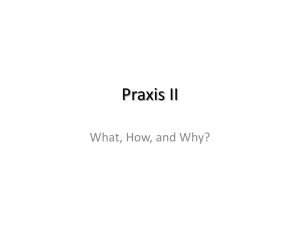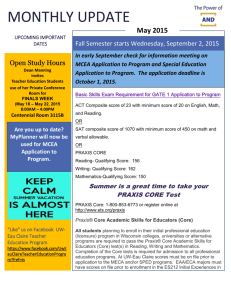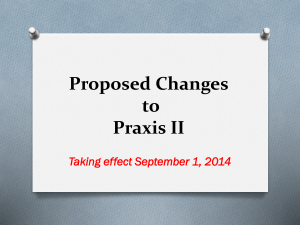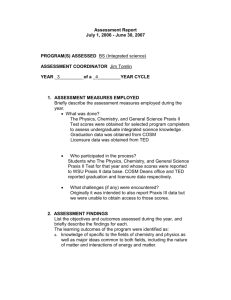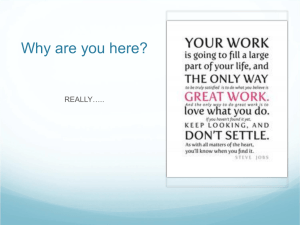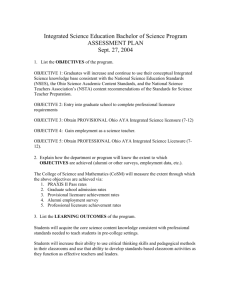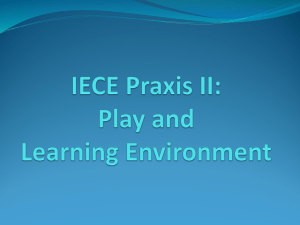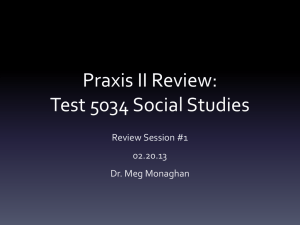HZ301/HZ9301 Advanced Creative Writing
advertisement
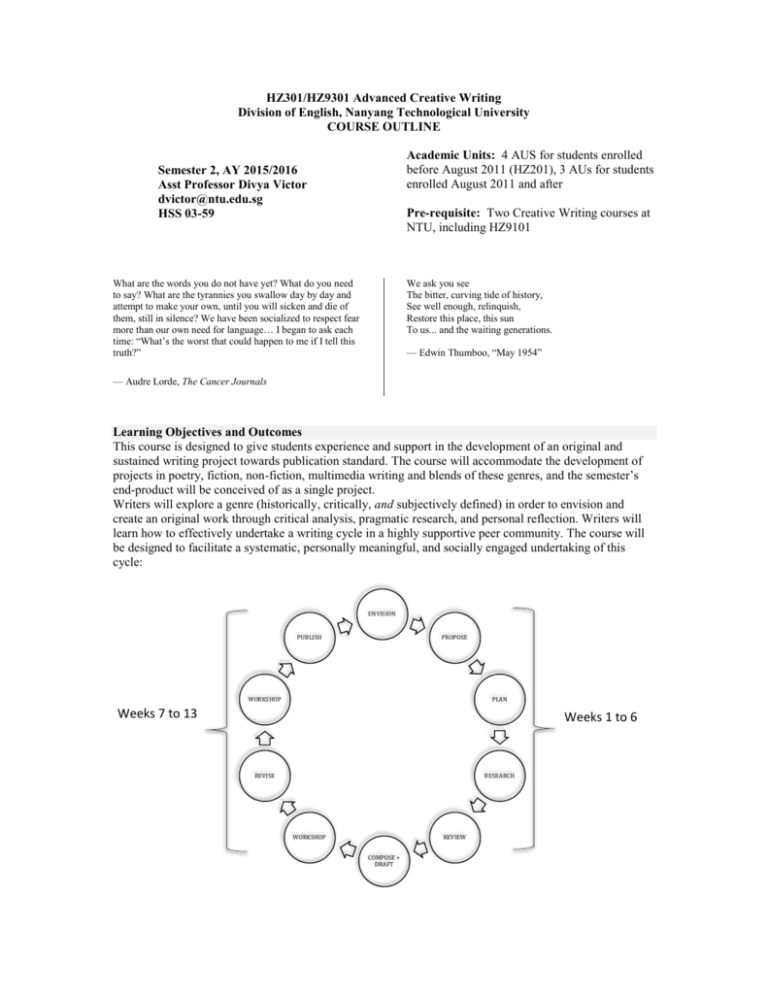
HZ301/HZ9301 Advanced Creative Writing Division of English, Nanyang Technological University COURSE OUTLINE Academic Units: 4 AUS for students enrolled before August 2011 (HZ201), 3 AUs for students enrolled August 2011 and after Semester 2, AY 2015/2016 Asst Professor Divya Victor dvictor@ntu.edu.sg HSS 03-59 Pre-requisite: Two Creative Writing courses at NTU, including HZ9101 What are the words you do not have yet? What do you need to say? What are the tyrannies you swallow day by day and attempt to make your own, until you will sicken and die of them, still in silence? We have been socialized to respect fear more than our own need for language… I began to ask each time: “What’s the worst that could happen to me if I tell this truth?” We ask you see The bitter, curving tide of history, See well enough, relinquish, Restore this place, this sun To us... and the waiting generations. — Edwin Thumboo, “May 1954” — Audre Lorde, The Cancer Journals Learning Objectives and Outcomes This course is designed to give students experience and support in the development of an original and sustained writing project towards publication standard. The course will accommodate the development of projects in poetry, fiction, non-fiction, multimedia writing and blends of these genres, and the semester’s end-product will be conceived of as a single project. Writers will explore a genre (historically, critically, and subjectively defined) in order to envision and create an original work through critical analysis, pragmatic research, and personal reflection. Writers will learn how to effectively undertake a writing cycle in a highly supportive peer community. The course will be designed to facilitate a systematic, personally meaningful, and socially engaged undertaking of this cycle: ENVISION PUBLISH PROPOSE WORKSHOP PLAN Weeks 7 to 13 Weeks 1 to 6 REVISE RESEARCH WORKSHOP REVIEW COMPOSE + DRAFT To broaden and develop their historical understanding of writing as a socially and politically rooted practice that is in conversation with other fine arts mediums. They will read and respond to carefully selected texts and objects across genres, disciplines, and mediums, including literary theory, journalistic texts, visual art, films, and performances by international and regional experts. Writers will also learn how to be effective and committed collaborators and members of a writing community in a high-intensity workshop environment that prioritizes interpersonal and writerly communication while meeting highproductivity goals every week. Finally, writers will engage in local and international writing communities through social-learning, by investing in local performances and readings, interviewing local and international visiting writers, and publishers. Assessment Week 1 to 13: PARTICIPATION: 20% Seminar presence and Workshop participation Week 1 to 6: RESEARCH AND DEVELOPMENT DOSSIER: 25% Weekly archival and investigative exercises, genealogy of influence, project proposal, annotations on research materials and others. (3500-4500 words) Week 1 to 13: COMMUNITY INVESTMENT: 15% One of the following items: Two event reviews, or a summary (and recording of) an interview with local authors or publisher, or a record of correspondence with a non-local writer (1000 words) Exam Week: FINAL WORK: 40% Prose (Fiction, Non-fiction, Other): 4000-6000 words Poetry (Prose, Verse, Multi-media): 8 to 12 discrete pieces in a series or other unitary form, or 1200-2000 words Multi-media (Cross media and performance): A unitary piece or series in which language is the primary medium1200-3000 words + Author Statement (600-800 words) Textbooks and Assigned Materials This is an advanced course that operates across genre and media boundaries. As such, the assigned readings (materials) will also be from multiple mediums and genres, including films, music, visual art, and live events. Students will be provided with a carefully curated Course Reader and a cache of multi-media content. They may also be expected to attend the occasional film screenings and make visits to publically accessible galleries and events. All efforts will be taken to ensure equitable access to students of all abilities. Course Outline Week Axis: An idea or theme around which we will read/view/engage. A set of coordinates that will direct us. 1 Axis| Motivations: What is praxis? Why do we write? We will explore our motivations, goals, and challenges as writers. We will get to know each other as writers and future collaborators Axis| Envisioning and Discovering What do you write about and what are you unable to write about? What resists description or exegesis? How do personal [unsharable/constitutive/undocumented] archives and memory inform your praxis? What are the social, linguistic, and political contexts that frame your person and praxis? 2 3 4 5 6 Axis| Discourse, Diction, Material Language How does language mean? What is a network of meaning? How do we negotiate vernacular, dialect, and regional variants in dialogue and voice? We will review diction, syntax, the line and sentence unit, semantics, figuration, and image. Axis| View, Scope, Psychic Distance How does perspective affect speaker/ character/reader relations? How does point of view influence emotional and cognitive engagement? What is the relationship between speaker/character psychology narrative mode? Axis| Line, Unit, Frame What is the shape of a thought or breath? How does the line and the sentence build the world of your text? How does the organizational unit (stanza, prose stanza, paragraph, episode) define the work? Axis| Arc, Plot, Sequence How can we describe and plan narrative plot? What is seriality and sequence of disclosure? How are readerly cognition, imagination, and emotion informed by textual arcs, pace, and development? Praxis: The acts of engagement and writing you will undertake. An application of learning and discovery of and through language. Praxis| Exploring Personal Archives Seminar Hours 3 Praxis| Situating the Self in a Genealogy of Cross-Media Influences Or Praxis| Anxiety of Influence? Author-sketch and the “Perfect Text” (Discovering resonant aesthetic values, separating from universals) Group discussion of aesthetic value and the “Perfect Text” Praxis| Proposing and Planning the Major Project 3 (Plan and proposal due) 3 Praxis| Research and Development Group troubleshooting and consultation 3 Praxis| Research and Development (Dossier due) Group troubleshooting and consultation Praxis| Composition and Drafting 3 3 7 8 9 10 11 12 13 Axis| Speech and Silence What is the relation between voice and dialogue? How can narrative voice learn from poetic embodiment? How might disembodied and appropriated speech contribute to the text’s environment? Axis| Sound and Music What can we learn from music and instrumentation? What can we re-discover in the poetic elements of consonance, assonance, rhyme and rhythm? How does sound’s materiality affect the prose sentence? Axis| Texture, Tactility, Tint What can we learn from visual, sculptural, and textile art forms? How does the gallery space differ from the page? (National Gallery Visit) Axis| Movement, Duration, Scale What can we discover from dance-forms and choreography? How can durational principles in performance inform the scale and function of the sentence and the line; the duration of a plot event; the shape of a collage or series? Axis| Space, Context, Environment What is the page and what are its limits? How might alternative mediums, performance, and physical installation open our understanding of communication and community? How does the author invent/enter a readership or thinkership? Axis| Ritual and Somatics What is the purpose of the body? To whom or what does the body of the writer belong? How does it serve, rule, and embody praxis? Author Visit: C.A. Conrad Axis| Reflection Praxis| Composition and Drafting 3 Praxis| Workshop (Letters and discussion) 3 Praxis| Workshop (Letters and discussion) 3 Praxis| Workshop (Letters and discussion) 3 Praxis| Workshop (Letters and discussion) 3 Praxis| Workshop (Letters and discussion) 3 Praxis| Workshop (Letters and discussion) 3
